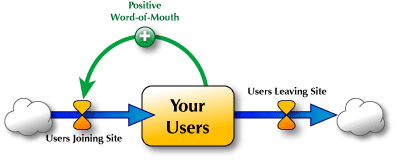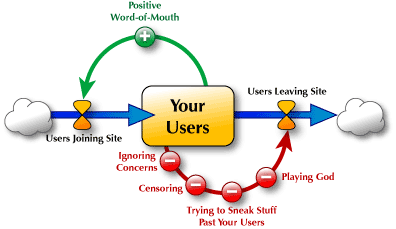4 Easy Ways to Stop Your Site From Self-Destructing
These days, there are a lot of online communities popping up all over the internet; just about anyone with a few hours to spare can build a niche for like-minded people to get together and chat. Sometimes these places grow quickly, powered by positive word-of-mouth and the right chemistry of participants. And yet sometimes, these same sites go POOF! into oblivion very suddenly, collapsing under the strain of a scandal they didn't know they had... until it was too late.
Let's take a look at how word-of-mouth works. Below, we have a very simple diagram showing your potential users on the left, your actual users in the middle, and your former users on the right. Positive experiences creative positive word-of-mouth, which increases the rate at which new users join up.

Here we've added four common mistakes that many sites make in their daily operation that not only increase the rate of departure, but also stem the flow of new users. The problem is that these four points are infectious... each one has the potential to ruin a community, but together they create a dangerous environment that positive word-of-mouth can't overcome.

Let's explore the points, and how to fix them before they become problems.
Never Ignore Concerns This is an easy mistake to make. Let's say a user writes in your forums that they don't understand the terms of your privacy policy. If nobody answers, you AND your community will be seen as unresponsive, which hurts your positive word-of-mouth. If you let the community answer for you, you will invariably give the conspiracy theorists enough of a foothold to suggest you're a front for the KGB... and in the absence of official denial, others will start to believe it. Every day that you delay in responding, you're undoing your good-guy image, and playing into fears that you're up to no good.
How to fix it? Answer every question promptly. If you get the same question a lot, make a FAQ. If you have too many places people could ask questions, assign some moderators to help manage the load. Even if people don't like the answer, their complaints will be limited if you reply quickly.
Never Censor (Especially Things That Make You Look Bad) The only thing worse than the top thread in your forums saying what a moron you are, is the painful absence of that thread in your forums after hundreds of people have read it. It's natural to want to hide conversations that have degenerated into a flame war, especially one aimed at you, but it will be seen as an abuse of power. If you stomp out that fire, you'll just incite people to write other posts about how you're censoring criticism, and you'll have to start deleting those posts too. This will not only do damage to your reputation, but it will also take up time you could have spent on more useful tasks.
How to fix it? The only way to deal with criticism is by reponding to it calmly and rationally. You may not be able to convince the complainer, but a coherent reply will show passers-by that you have a position that can be articulated. Leaving the thread intact will show future readers that you actually do take complaints seriously.
Never Try to Sneak Stuff Past Your Users If you need to change your privacy policy, don't make the changes quietly and hope no one will notice. If you go from no-ads to Flash ads, don't act as if nothing happened. People are amazingly forgiving when it comes to changing the status quo, but in a community setting, your users will want to feel like they were consulted first. You may own the infrastructure, but they make the "content". If you're seen to be changing the rules of the game without fair warning, the changes will be rejected by more of your users, and your reputation will suffer. Everyone wants to feel like they own the land they live on, even if they don't.
How to fix it? A simple notice about site changes is sufficient. You don't need to alter your roadmap based on user suggestions, but you might actually be surprised at some of the things they dream up. If your change is expected to be upsetting to the community, write a longer piece about how you arrived at this decision. Apply #1 to the conversation, and help calm people's nerves.
Don't Play God You control the infrastructure, the coding, the moderating, and everything about your site. Everyone knows you're all-powerful, so don't go around demonstrating it. Promoting your own ideas above everyone else's, or punishing your critics, or trying to ban people that you personally dislike... these tactics will all end in tears. An abuse of power by the site administrators will create a backlash, which will teach you the most important rule of online community-building: you only count as a god if there are people willing to stay in your temple.
How to fix it? Use your site like any other user. Write posts, reply to posts, chat with people, and show everyone you can operate at the "common" level like anyone else. Solve problems like your users do, not with your bag of tricks. You'll create more positive word-of-mouth, and as a bonus, you'll get a better feel for how your site actually works on a daily basis.
Overall, the theme is "transparency", which (consciously or not), most Web 2.0 users like to see. If you try and be as open and accessible as possible, your users will have fewer reasons to leave, and your site should be able to grow according to its qualities, not despite them.
